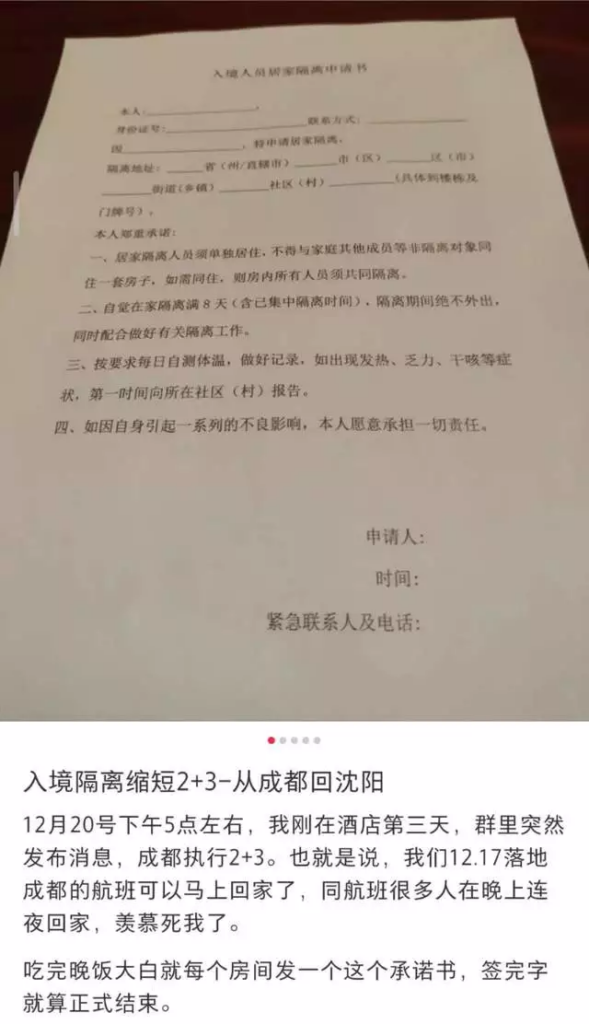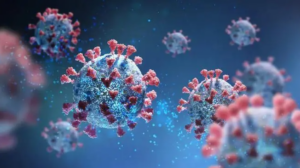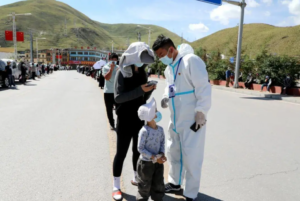
Positive can be isolated at home, returnees still need “5 + 3”?
As the year draws to a close, more and more people from foreign countries are making the journey back to their home countries. Although the entry policy has been relaxed compared to the previous one, there are still some differences compared to the local positive infected persons who can be isolated at home. At present, in addition to the 48-hour nucleic acid certificate, the entry has to be 5 days of intensive isolation medical observation + 3 days of home health monitoring.
According to the notice issued by the National Health Commission on November 11, the fusion mechanism for inbound flights will be abolished and the certificate of 2 negative nucleic acid tests within 48 hours before boarding will be adjusted to 1 negative nucleic acid test within 48 hours before boarding. At the same time, the isolation policy for inbound personnel was adjusted from “7 days of centralized isolation + 3 days of home health monitoring” to “5 days of centralized isolation + 3 days of home isolation”.

Photo
The new article is the first of its kind, and many people are looking forward to the further relaxation of the entry policy. Optimization and improvement.
Due to the different segregation policies implemented in different places for people entering the country, many returnees have experienced various twists and turns. Whether “landed Yang”, or the entire process of uninfected personnel, when they end the closed-loop centralized isolation with “negative nucleic acid results”, they will face the risk of being surrounded by infected people.
It is worth mentioning that on the afternoon of December 20, news came from Chengdu that the entry isolation policy was changed to “2+3” (2 days of hotel isolation + 3 days of home isolation), according to media reports, the Chengdu Epidemic Prevention Command said that this move should be a trial run for the isolation hotels in Chengdu, and that the current entry isolation policy as notified by the higher authorities is still “5+3”. However, the returnees are beginning to expect that the entry quarantine policy in other cities will also be loosened as soon as possible.
A tortuous entry experience
In the past few days, there are rumors that the entry isolation policy will be adjusted to “2 days of centralized isolation + 3 days of home isolation”, but as of December 21, this news has not been officially confirmed. In contrast, the number of people returning to China from abroad is gradually increasing as the year draws to a close. A staff member of a travel agency in Hebei told China Newsweek that since November 11, the number of people inquiring about tickets to return home has skyrocketed, and in December, the number of returnees has further increased.
At 5 p.m. on Dec. 19, Dai Li (a pseudonym), who studied in Germany, landed at Shanghai Pudong Airport. As a foreign national, she chose the “2 + 3 + 3” isolation program, that is, the hotel in Shanghai to focus on isolation for 2 days, after the bus transfer to the hometown of Jiangsu set the hotel to focus on isolation for 3 days, if the nucleic acid test results are normal, and then the community sent a special ambulance closed-loop transfer to home, continue to home isolation for 3 days. However, the community of Dai Li’s home clearly informed that because of limited resources, the request for a special bus transfer could not be realized, she may also need to complete the last 3 days of isolation at the hotel.
After 13 consecutive hours on an international flight, Dai Li went through the process of declaring the customs black code, lining up for nucleic acid, taking her temperature, quarantine and disinfection, assigning a quarantine hotel, and closing the loop for transfer. When she arrived at a quarantine hotel in Jiading District, it was more than 9:00 p.m. The 200-yuan-a-night quarantine environment was unacceptable to Dai Li – the hotel had no elevator, she brought more than 36kg of carry-on luggage, and the room was arranged on the 4th floor; perhaps the renovation was not yet over, and various types of renovation materials were piled up in the hallway; the disposable shoes in the room were broken. Unpacking that is broken, the lighting is also malfunctioning, the most difficult to accept is that during the isolation, they can not order take-out, receive courier, can only accept 50 yuan a day meal box, “the morning buns in the hands, basically cold, the filling is all I am allergic to leek, celery.”
Dai Li could not resist the isolation photos posted on social media platforms, did not expect, many inbound personnel expressed the same encounter. Some people couldn’t use hot water in the hotel, and the room lighting was restricted to between 5 p.m. and 7 a.m.; some people only had noodles in clear soup and a packet of pickled vegetables in their daily box lunch; others were told by the hotel staff that resources and manpower were limited, and the rooms they stayed in were too late to replace the cloths and grass, and only a simple disinfection was carried out.
On the flight back home, Dai Li met the British student in the next seat. Her return flight was booked for January 9, and she had only about 20 days to return to China, 8 of which were occupied by the quarantine of the epidemic.
Her friend who studied in Europe also talked to Daili about her return experience, and after counting the many inconveniences, she finally gave up her plan to return to China, whether it was the cost of quarantine, the possibility of more than 7 days of quarantine time, or the physical exertion, it was not cost-effective. Another reason was that she hadn’t been positive for a year or two while studying abroad, and even if she ended the closed-loop quarantine with a negative nucleic acid result, she would still face a great risk of infection when she returned to society.
Ai Lin (a pseudonym), who returned to Shenzhen, Guangdong, from Hong Kong, also experienced ups and downs. According to the regulations, from the Shenzhen Bay Port of entry to the mainland people need to first go to the “health a room online reservation system” to fill in personal data, pending the system review and approval, the entry of people can only lottery registration, after winning the lottery to have the opportunity to return to Shenzhen. However, special groups such as elderly people aged 70 or above, children under 14, pregnant women and foreign students staying in Hong Kong for more than 5 days can apply for the Humane Care Pass.
On the night of December 17, after 14 days of shaking, Aileen was lucky enough to win a ticket and was able to return to Shenzhen on the 18th.
The situation is urgent, Ai Lin packed his luggage, spent more than 400 yuan to do an expedited nucleic acid test, and bought more than 500 yuan of drugs. “Family members and many friends Yang, said that you can not buy drugs, buy drugs to save yourself, but also want to even to them to slow down the emergency”.
After taking the subway, transferring buses, crossing customs, nucleic acid testing and security checks, Ailin drew to the isolated hotel in Longhua District. Compared to Dai Li, she is in a comfortable isolation hotel environment, but the price is also higher – 450 yuan per day for accommodation, 100 yuan for meals, in the hall, Ai Lin scraped together, delivered more than 2,000 yuan isolation fee, “thousands of dollars, for students or not too much to spare “.
“I yang during the quarantine.”
For the inbound quarantine personnel, in addition to receiving five days of centralized isolation, more worried, if tested positive during the landing test and centralized isolation, may face a more troublesome situation.
Lina (a pseudonym), who flew back to Qingdao, Shandong Province from South Korea, was one of the “landed little yang people” and was verbally informed by the epidemic prevention staff on December 17, the fifth day of quarantine at the hotel, that the seventh nucleic acid test was abnormal. At one point, Lena suspected that there was a problem with the hotel’s epidemic prevention. Before returning home, her PCR double test in Korea was negative, and she did not experience any physical discomfort. “She wore an N95 mask for the entire trip, and her nucleic acid was fine for the landing test and the first 4 days of quarantine. But the hotel environment is not clean, and there are people who say that some employees of the isolation hotel in Qingdao also appear to be infected”.
The following day, Lena and the passengers who landed on the same flight in the hotel were transferred to Qingdao Women’s and Children’s Hospital for seven days of treatment. Of concern is that the local CDC did not retest the throat swab after it showed abnormal nucleic acid testing. During the transfer, they were also allowed to bring only close clothing, disinfected luggage, computers and other items could only be stored in the hotel, and the rooms they stayed in would be fully disinfected.
In the hospital, Lena, who had not yet developed symptoms, was placed in the same negative pressure room as 2 other travelers. After the emergence of fever and cough, she took the initiative to ask the hospital for a box of Lianhua Qingdian capsules and cough syrup. Those who showed obvious symptoms such as vomiting and diarrhea were required to do blood draws and other tests, “Those with mild symptoms, except for the nucleic acid test at the end of the treatment, there is no daily testing and treatment, which actually amounts to self-healing in hotel isolation.”
According to the hospital’s rules, incoming patients with newly crowned pneumonia are required to have 2 separate nucleic acid tests on days 6 and 7. Lina and the 2 patients in the same room heard that if 2 consecutive negative nucleic acid test results, only then can be transferred to the hotel for 7 days of observation, “during this period no re-positive, in order to go home in isolation, and the hotel requires the home community to issue a certificate of acceptance can be home isolation, before agreeing to release people.”
Lena told China Newsweek that a few days earlier, one of her Hebei friends also developed nucleic acid abnormalities during the quarantine in Qingdao. After finishing treatment at the same hospital, the friend applied for home isolation instead of hotel isolation observation, but local epidemic prevention staff demanded that a certificate must be issued by the hometown community and then a special vehicle must be sent for closed-loop transfer. After calling the police and repeatedly communicating, the family in Hebei eventually drove six hours overnight to Qingdao to pick her up with a certificate of voluntary home isolation stamped by her hometown community and the epidemic prevention center.
Currently, Lina is still in isolation at the hospital and they have not received accurate news on whether they will need to return to the hotel for isolation again afterwards. “There is no clear answer from the hospital and we will have to wait for the final nucleic acid results to come out before we know the follow-up arrangements.”
The informed letter issued by Qingdao Women’s and Children’s Hospital for cost settlement shows that foreign and Chinese patients of Chinese nationality returning to China with new coronary pneumonia, who do not participate in basic medical insurance, will have their medical expenses borne by the patients personally; if they participate in commercial health insurance, they will be paid by the commercial insurance company according to the contract; if they participate in basic medical insurance, they will be paid by the medical insurance fund according to the regulations, and the part of the Chinese patients’ personal burden will be fully subsidized by the finance, and foreign Patients with Chinese nationality will be fully subsidized, while foreign patients will not receive financial subsidies for their personal burden.
A foreign student in Lina’s ward told China Newsweek that she did not have medical insurance in China and might face higher treatment costs when she was subsequently discharged from the hospital.

Qingdao “landed in Yang” and was transferred to a local hospital for treatment.
Another netizen who landed in Shanghai also shared her experience on social media platforms. After entering Shanghai Pudong Airport on November 29, she was placed in isolation at a hotel in Qingpu District with a daily room rate of 500 yuan. 3 days later, she tested positive for nucleic acid and was transferred to Jinshan Hospital for treatment, where she was given blood tests, medication, isolation, etc. The total cost for 8 days was 6,000 yuan. Subsequently, she was sent back to the previous quarantine hotel for isolation. Unfortunately, after 5 days, the nucleic acid test results showed a reversion to positive and she needed to wait another 3 days for the nucleic acid retest to be negative before the centralized isolation could be ended. During these days, her quarantine expenses have exceeded 10,000 yuan.
Looking forward to further relaxation of the entry quarantine policy
On the afternoon of Dec. 20, the policy of entry isolation was again relaxed. On social media platforms, many people who entered Chengdu from overseas received notification from the epidemic prevention personnel that they only need to undergo two days of hotel quarantine, and if the nucleic acid test results are negative, they can sign an “application for home quarantine of inbound personnel” to be released from the quarantine procedures.

A number of people entering the country from Chengdu said that they could leave after 2 days of centralized quarantine in the hotel and a negative nucleic acid test.
Li Xiang (a pseudonym), an international student who flew from Hong Kong to Chengdu, told China Newsweek that according to the previous policy, she would end her 5-day centralized quarantine at 9 p.m. on Dec. 21, but on the afternoon of Dec. 20, the hotel issued a notice that all guests, except positive and suspected positive people, could leave at 6 p.m. that day. She heard that some of the hotels in Chengdu, there is also the case of overnight release.
At the same time, there seems to be a relaxation of the “landed Yang” policy around the world. Coke, a netizen who returned to Guangzhou from Cairo, Egypt, told China Newsweek that he entered the country at the end of November and that, according to the requirements, after an incoming person tests positive, he needs to be transferred to a hospital for treatment until the Ct value of the nucleic acid test is greater than 35 before he can be discharged. “But a friend who recently returned to China said that now landing in Yang also only requires isolation at the hotel.”
The above situation was also confirmed by a netizen who returned to Zhuhai from Hong Kong. on December 17, she was found positive during the isolation of the international health post in Zhuhai, the post staff only asked her to move to the positive floor isolation, “the follow-up should be enough to live for 8 days, and so on the 6th and 7th day of continuous negative nucleic acid, you will be able to leave the post, and go home no longer need home isolation “.
“Outside everywhere in the Yang, but the negative is isolated in the hotel”, Dai Li said, her relatives in her hometown have all been infected, even if safely through the quarantine period, the next she may also be infected, “Moreover, many people have been hit.”
Those outside the country who have not yet returned are still looking forward to further liberalization of the entry policy. They hope to minimize the cost and time spent in centralized quarantine.
Lena, who works at a college in the country, applied for the opportunity to study abroad after the New Crown Pneumonia outbreak. 2021 arrived in South Korea with a half-month on-campus quarantine, and upon returning home after the course, she underwent a total of 28 days of quarantine – first 14 days in a hotel in the city where she landed, then returning to the city where the college After returning to the city where the university was located, she was placed in intensive quarantine for 7 days, and after the nucleic acid test was clear, she was placed in closed quarantine at home for another 7 days. Her study abroad experience has been dominated by various nucleic acid tests and quarantines.
“Now the policy has actually been much more lenient, but the country has been liberalized, centralized isolation would seem out of place”, Lena felt that the current policy for entry isolation varies from place to place, causing much inconvenience to those entering the country. 20, after a returning friend she knew tested positive in Qingdao, because he refused to be transferred, he was eventually allowed to to be quarantined in the hotel. “Actually, I still hope that the unified policy will be clarified as soon as possible.”


Average Rating